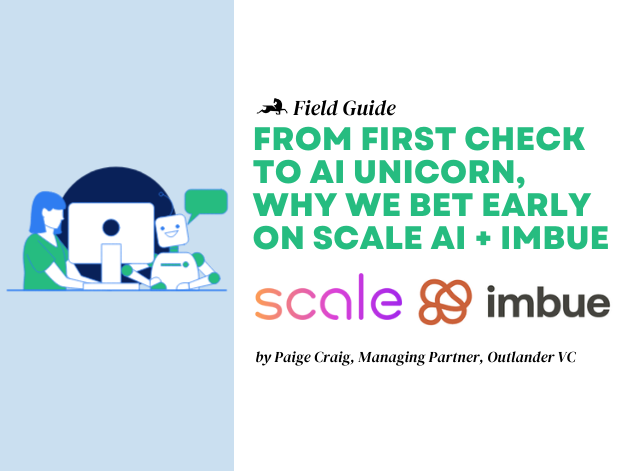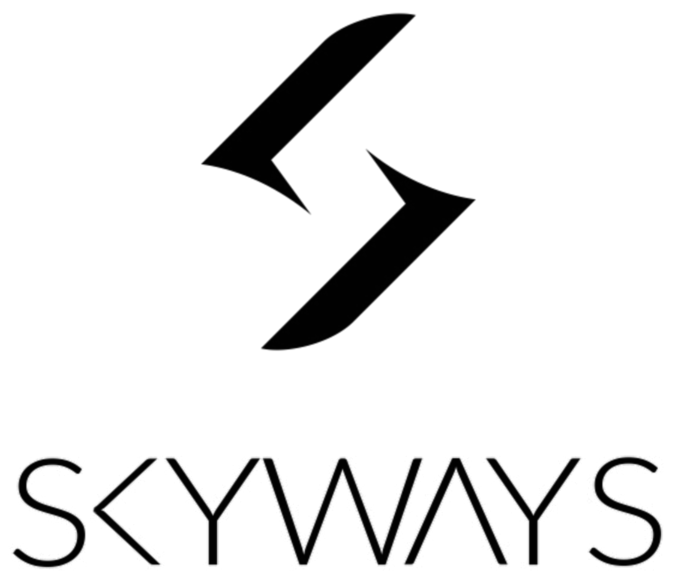From First Check to AI Unicorn, Why We Bet Early on Scale AI + Imbue
Posted by: Paige Craig
Posted on 11/29/2023

Posted by: Paige Craig
Posted on 11/29/2023

I have been investing in AI startups for most of the last decade. AI startups have been hot recently, with a reported $75 billion invested in the space in 2020 alone. In 2016, however, getting investors to take AI seriously was no small feat. Then, AI felt like something from Star Trek, and while the ideas were fascinating, many investors wondered, “How will you make money?” Admittedly, it is hard to predict how foundational technologies will create value but I’ve always hedged my bets on exceptional founders first and foremost, which is what led me to write first checks into two AI unicorns back in 2016.
When I was introduced to the Scale AI and Imbue founders, they were purely in the idea stage: pre-product and pre-business model. That year alone, I’d received hundreds of AI startup decks, investing in only five or so. Of those handful of AI bets, only these two grew to multi-billion dollar companies. In both instances, it was all about investing in the right founders, then helping them find the right vertical.

From recruitment tech to Imbue:
In January 2016, I was introduced to the founders of Imbue. Formerly known as Sourceress, they were building an AI tool to source candidates for recruitment efforts, match those candidates with open roles, and send personalized outreach to schedule initial interviews. From our first call, the founders were exceptionally smart, curious, and customer-driven, jotting down notes from our discussion on how to build a successful brand. There was no fundraising deck, but only three months into building the business, they’d already acquired customers, proven initial interest, and were poised to solve a massive problem using AI.
By February 2016, we became their first investors, investing $500k at $4.8M Cap. Over the next five years, I introduced the founders to potential customers and met with them for monthly brainstorms, especially as they worked through their pivot in 2019. While the initial focus on recruitment had already evolved into sales, their pivot to an AI with more generalized intelligence was the key to their success. With this broader scope, Imbue has created a fundamental technology that will change the world. With its latest $200M in Series B funding and $1.5B valuation, Imbue’s primary mission is to drive the development of AI systems capable of advanced reasoning and coding. The company is poised to create practical AI agents capable of accomplishing substantial tasks while maintaining safety in real-world applications.
One of the few women-led AI unicorns, Imbue co-founder Kanjun Qiu is really excited about “how can we make that accessible to everyone so that everyone can imbue intelligence and be able to use that intelligence.”

From medical matchmaking tech to Scale AI:
Back in April 2016, Scale AI co-founder Lucy Guo reached out to me on Twitter, pitching the first iteration of Scale AI. Initially, they were building a tool to help millennials find medical professionals with the unique idea of rating specialists by specific tasks/procedures versus a generic rating. While I wasn’t 100% sold on the product/market, I was beyond impressed with the founders. Both Lucy Guo and Alexandr Wang are hands-on, driven, brilliant, and possess the kind of locus of control and communication skills that inspire others to join their teams, help them succeed, and invest in their vision. In every conversation with Lucy, she is unfaltering in her creative problem-solving and unafraid to experiment and adjust until something finally works. These things were true in 2016 and remain true today, which is why our #1 investment criterion is always the founding team.
Two months later, Lucy reached out with their latest pivot, the Scale API: “With just one line of code, you can deploy a human on-demand to do tasks such as content moderation, data extraction, appointment scheduling, and more!” I immediately wrote back to tell her this pivot was critical and that they should drop everything else and run with it. With their exceptional Founder Framework scores, I knew they could build something big and had the grit to pivot as needed. So, in August of 2016, I invested $150k SAFE on a $3M cap in what is now Scale AI, the $7.3B AI unicorn; and then reinvested months later when they raised a much larger seed round.
Most recently, co-founder Alexandr Wang was recently named one of the top 100 Most Influential People in AI and spoke at the White House on the risks of AI, while Lucy Guo has joined our portfolio a second time with her latest venture: Passes.
–
Now that AI has become crowded with everyone on the hunt for their AI unicorn, I take a slightly different investment approach. I still look for the right founders and the right vertical, but I take a more nuanced approach looking for niche, verticalized applications of AI largely within SMB, enterprise, industrial and government applications.
A few examples below:

Coco Delivery – AI for Enterprise Logistics
Coco Delivery has married robotics with AI to augment its human workforce. Coco’s robot delivery fleet is driven remotely by humans plus an AI co-pilot. Learning from the human drivers, the AI co-pilot is initially used to augment the human driver, quickly reacting to obstacles, monitoring speed, etc. Eventually, the AI co-pilot will replace the need for a human driver piloting every delivery, elevating the human workers to oversee fleets of robots.

Fabi – AI for Data Science
Fabi is leveraging AI and natural language processing (NLP) to democratize data insights. Fabi’s AI enables seamless communication with datasets for non-technical teams, empowering them to extract meaningful insights independently. Likewise, leveraging Fabi’s AI enhances the efficiency of data science teams by transforming the way they analyze data and providing advanced tools for analysis. Fabi’s application of AI ultimately fosters a more collaborative and productive data-driven decision-making process across many industries.

Skyways – AI for Drone Navigation
Skyways is a company at the forefront of advancing drone technology. In addition to their innovations in aviation, Skyways is leveraging AI to overcome traditional limitations and enhance the autonomy of drones. Skyways’ cutting-edge AI technology allows drones to navigate and operate seamlessly even in areas where GPS signals are unreliable or unavailable. This technology has significant implications for various industries, opening up new possibilities for autonomous drone applications in challenging and complex environments.

Barometer – AI for Brand Safety
Barometer leverages advanced artificial intelligence to enhance brand safety and contextual targeting in the realm of podcasts. Their innovative approach involves machine learning algorithms to analyze and understand podcast content, ensuring that advertisers can maintain a safe and contextually relevant environment for their brands. This innovative approach allows major brands to ensure their advertising is aligned with values in a rapidly growing podcast space.

Crow Industries – AI for Mining Operations
Crow Industries (CI) is building the Robotic Labor Force of the mining industry, creating autonomy for heavy equipment and underground operations. CI’s initial product enables the mapping of mines 10X faster than traditional methods, while simultaneously collecting real-world training data for the autonomous models. CI’s robotic solutions are addressing the ever-growing need for safe and reliable labor as the mining industry rapidly continues to grow.

Vidrovr – AI for Video Analytics
Vidrovr uses patented AI and multimodal machine learning algorithms to understand video like a human would, and then helps businesses make smart, efficient, and profitable decisions based on the information in video. Vidrovr is revolutionizing an outdated and arduous process of data collection, analysis, and instrumentation by bringing the task to the physical world through video analysis. Today their system is driving efficiency for leading federal and private sector companies.
Within AI, we are particularly focused on startups using this formula: 1) a gritty, complicated, or mundane job that usually requires a human worker to be on-site somewhere to do the job, plus 2) AI that learns from that human worker until it can do the labor intensive/repetitive or complicated tasks at a faster, more efficient rate. AI’s ability to extend a person’s capabilities will revolutionize how we work and live, and that’s where I’ve always loved to invest.

Paige invests in brilliant founders from across the US, using his Outlander Founder Framework to drive returns in the top 5% of VCs globally.
Whether you’re actively raising, building your future unicorn, or interested in our game-changing companies, each Field Guide is personalized for founders and investors alike.
Sign up now for exclusive access to our network of industry experts and to keep up with who we’re funding through our biggest and boldest endeavors to date.
You don’t want to miss the game-changing ideas we’re morphing
into reality, in real time.
Join the Outlander pack for exclusive access to our network of industry experts, the latest from our portfolio, and more: